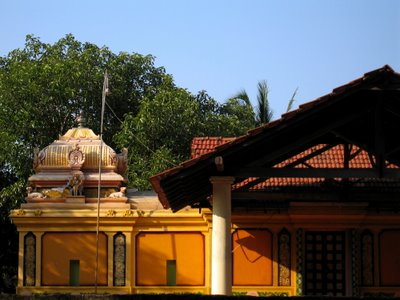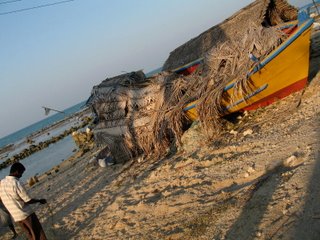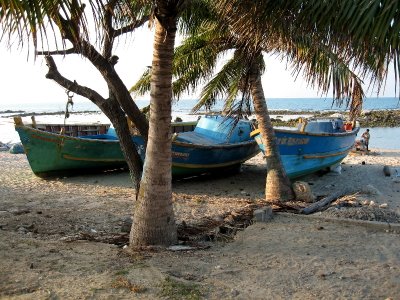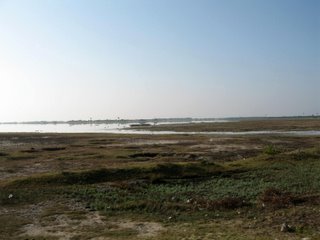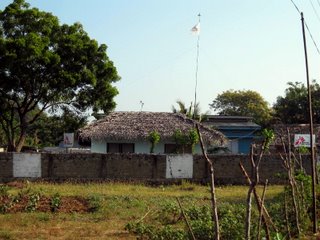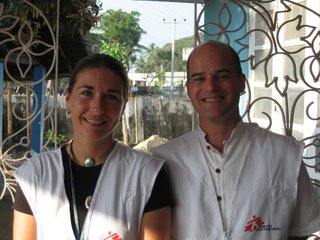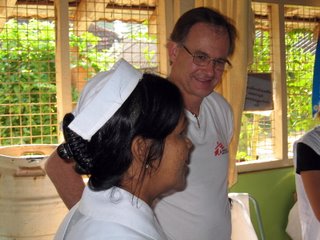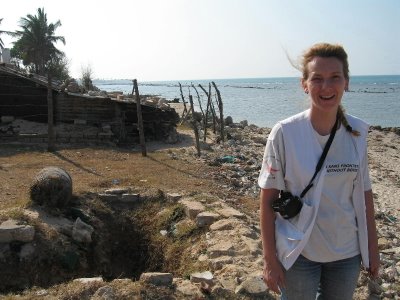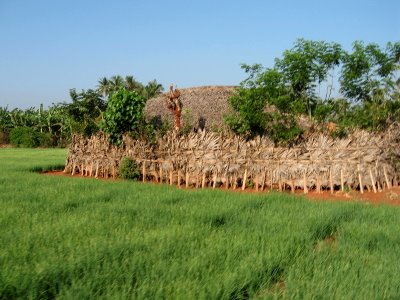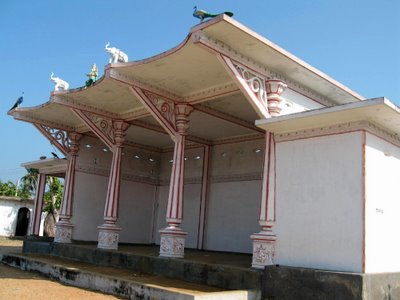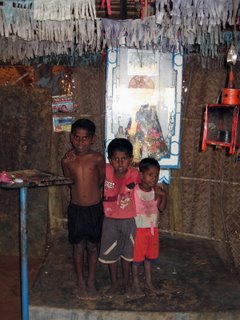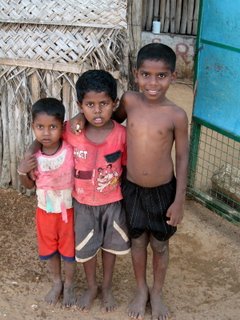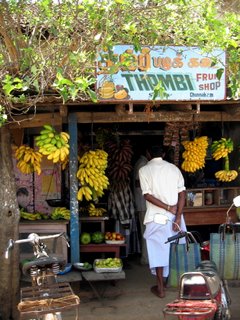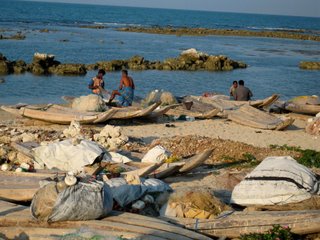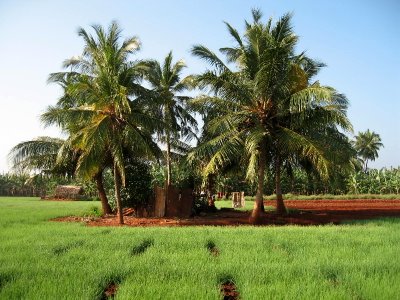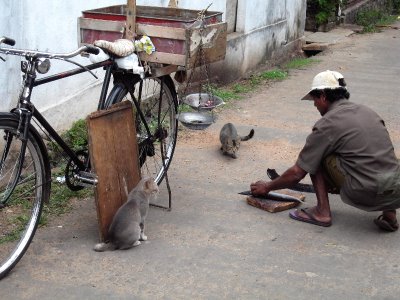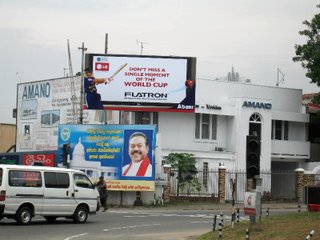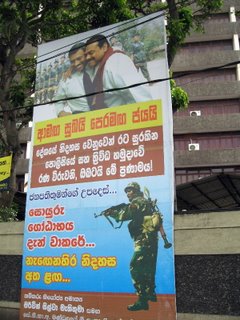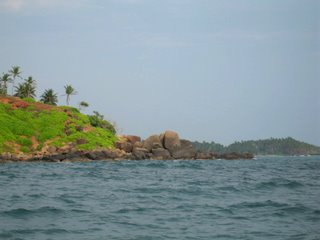
We three admins of MSF Holland, France, and Spain are: Violet, Paul, Ulises, partners in untangling bureaucratic red tape.
As I write this, I’m in one of those rich in-between moments full of sadness and potential, and in some ways scary, to the extent that I’ve come unmoored from the work and colleagues that have been my anchor since arriving here in Sri Lanka. My friend and counterpart Violet, from MSF Holland, and I had our little farewell gathering down at Mt Lavinia Hotel yesterday afternoon and I opted to spend the night here as well, rather than going back and being underfoot around the house and office, with my replacement already settling into his position. So I write this while watching the blue waters out my window and hearing the waves break, pondering the irony that early this morning - on the very day I’m scheduled to fly out from the international airport -- the LTTE introduced a new tactic in their conflict with the government of Sri Lanka: light aircraft attacked an air base next door to the airport.
Last week I visited our project in Point Pedro briefly, to introduce my replacement and say goodbye to my colleagues and enjoy one last time the rich red soil, azure sky and verdant fields of the peninsula (along with a heavy dose of the usual road dust!). It would be the ultimate irony if, having worried that something would happen to delay my return flight from Jaffna and thus my trip to Paris, it turned out to be attacks here in Colombo that delay my departure. From what I hear now, this seems unlikely.

Sitting on my balcony while staring at the waves has given me time to ponder the meaning of life a bit. Two+ years ago I left the US and felt, I must say, rather brave about it. Not so brave as some of my friends thought – you know, leaving the so-called security of corporate America behind for the unknowns of a life doing humanitarian work in the developing world -- but brave nonetheless, on some level. I’m no longer so sure. I’ve grown used to seeing more semi-automatic weapons and soldiers than I ever expected. I’ve learned what shelling sounds like from a distance. (It’s never been terribly close, on my visits in Point Pedro, though I did hear my loudest on the recent visit – which was still fairly far away.) Soldiers blocking the road so that military convoys can pass by unimpeded and unworried about suicide attacks are something I seem to take pretty well in stride now. And there’s no shadow of doubt that I feel more alive doing this than I’d feel if I’d stayed at my day job in the US.
I think I now live on two levels: part of me knows, remembers, and misses the comparative stability and day-to-day sameness of life in the US. Another part of me now knows viscerally what a big world is out here, and how much there is to experience, learn and live here. An Obie friend, Kris, was surprised that what I write most of missing is the foods: bagels, cheese enchiladas, and so on. Naturally there are things I miss more: friends, family, long hikes in the Sierras or walks on the beach in Mendocino County. But the friends and family keep in touch by email and even phone, and I can hike in Ella or walk on the beach here in Mirisa. But I can’t sit at an outside table on Sunset Boulevard in West Hollywood, with a bagel and a good coffee (a rare commodity in Sri Lanka), pondering why Americans are so committed to worshiping at the alter of consumption, and feeling holier-than-thou because I’ll soon be back in some place where the electricity is scarce and the bagels are even more so.
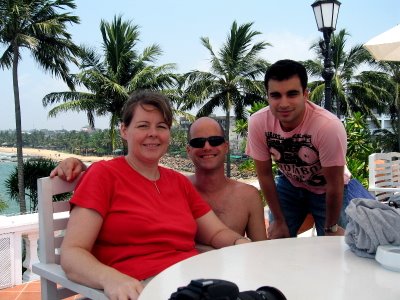
Enough of this. This loooong first chapter of my life with MSF is about to end, more than two years after I headed to Paris in February 2005. I’ve learned life is just life, wherever you are in the world; work is just work, and if that’s the case, I’d rather do work that has a different goal than increasing a corporate president’s year-end bonus so he can buy another Hummer in which his kids can sit in the backseat watching different DVDs with headphones on, while all the commentators bemoan the loss of family values in the US.
I’ve learned above all that I cannot do this without my wonderful friends and family who have read the blog and posted comments and notes, sent me emails and postcards, care packages and books and DVD’s, and generally helped me stay connected to that other side of my life to which I’ll be returning shortly. And then there are all of you who contribute to MSF – for which I thank you VERY much, since it makes all this work, which I like to think is valuable, possible. I’m really afraid to list names, since I’m sure I’ll miss some…but: Steve D and Steve B, my most regular phone and email contacts through the years, one of whom sent regular infusions of good books and DVDs, and the other of whom twice came to visit me in Asia, once being so good as to bring along Mom and a suitcase full of books and other goodies; Glorianna, a friend I’ve not even met yet, but who arranged for some great books to come my way, which I’ve been very much enjoying; Jill & Chuck, always ready with a funny t-shirt and useful information; Howard & Gene, Amy & Nancy, Neal & Elizabeth; Bill & Bobbie, regular blog readers who are making my summer vacation possible!; Connie & Anne, Michele T, Midge, Deb & Carl, Gary – quiet but never gone! – Steve E, Cat in BJ; darling Ondrej, whom Cat describes as “even better-looking in person than his blog makes him seem,” Mutti, Vati, Jens, Birgit, Fabian, Miriam, Daniel and Jan. Here in Colombo: Jim & Richard, Toby, and Omar, all non-MSF friends I’ve been happy and proud to have in my life here.

I’m going to close here, probably logging off the blog for a good chunk of time, with a belated thanks to my exchange sister in
Germany, Sigrid. She greeted me at the
Hamburg airport in 1980 when I arrived for my exchange year living with her, Jens, Mutti & Vati. In a sense this makes her the first person ever to welcome me to an expatriate existence, and throughout that year and the years since, it has warmed my heart to know that her light and energy enliven in the world. My loss is a small candle compared to the grief and loss of her sons, daughters, mother, father, brother, sister-in-law and husband, but it’s a loss nonetheless. She passed away during my first visit to
Jaffna in February, after holding on as long as she could against malignant cells which had taken over too much of her body.
I don’t know what to say, other than that I will miss you Sigrid, I will continue to take pride and joy in knowing your wonderful children and family and spending time with them when I can, and I will try to honor your energy and life by living as much in the moment as I can, and being as generous and warm as I know how to be, for as long as I can.
Signing off from Colombo, urging us all to spare a smile and some warmth for someone we don’t know, and a thought to people less blessed than us, thanking you again for tuning in to my meandering thoughts and photos…this is so much world, so little time.


 I’m going to close here, probably logging off the blog for a good chunk of time, with a belated thanks to my exchange sister in
I’m going to close here, probably logging off the blog for a good chunk of time, with a belated thanks to my exchange sister in 
